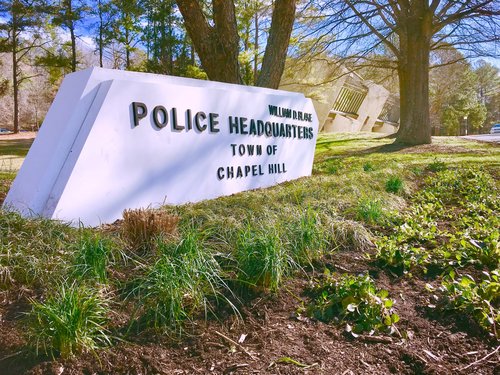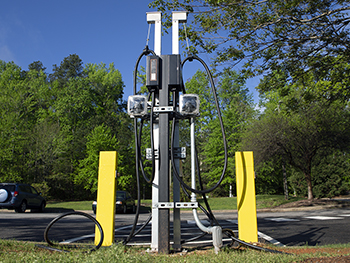The Chapel Hill Town Council discussed potential development plans for the 828 Martin Luther King Jr. property at its April 27 meeting, a necessary step for advancing the town’s plans to address coal ash on the site.
The land, where the current Chapel Hill Police Department has been located since the 1980s, is now set to be reviewed by the state’s Department of Environmental Quality to guide future decisions on how, or if, to redevelop the site.
The 828 MLK property has been a contentious site in the community after coal ash was discovered on the lot in 2013. According to the Environmental Protection Agency, coal ash contains toxic contaminants such as mercury, cadmium and arsenic which are associated with cancer and other illnesses.
For the past nine years, environmental consultants have monitored and analyzed the site to determine the best ways to reduce the impacts of coal ash on the environment and human health.
Discussions of the property’s future picked back up again in recent months as the Town of Chapel Hill aims to improve its police department and emergency services facilities.
In an 8-1 vote on March 23, the council passed a nonbinding agreement to continue discussion on potentially developing the 828 Martin Luther King Jr. property. During the meeting, council members reviewed and discussed a concept plan for redeveloping the site — which the council does not have the ability to approve or reject.
In addition to a new emergency services station, the concept plan includes a plaza with 450 parking spaces and a 200-unit apartment building spanning from Bolinwood Drive to Bolin Creek. The site will also have a bus stop on the future North-South Bus Rapid Transit line.
“I hope that we can elevate the dialogue moving forward,” council member Karen Stegman said during the meeting. “I think that it’s such an opportunity to create great outdoor spaces with plazas and creative use of textures and I just think it could be really exciting and a cool place to hang out.”
Although Stegman and other council members supported the project, council member Adam Searing — the sole opposing vote in the nonbinding agreement — continued to express concerns over the housing plan.
“There’s coal ash pouring out of the site right now, you can just go down to the hillside and see it,” Searing said. “What I’m struck by the most in our discussion is the language we’re using and the reasons were using for putting housing on the coal ash site. [They] are so similar to what other town officials in other areas and other times, [who] were building on these exact same kind of sites, used to justify building housing and inviting people into these sites.”
Amelia Covington, a field organizer with Climate Action North Carolina and former Chapel Hill resident, also expressed concern over building houses on the 828 Martin Luther King Jr. property.
“There’s a lot of dangers from long term exposure to coal ash. It can lead to liver damage, kidney damage, cardiac arrhythmia, and a variety of cancers,” Covington said. “Personally, my love for the environment was born out of long days playing in the creek by my childhood home in Chapel Hill. Kids are bound to explore their backyards and they should be able to without exposure to toxic substances found in toxic coal ash waste.”
Studies conducted by Town of Chapel Hill consultants found high mercury levels in the city’s groundwater as well as several coal-related contaminants. However, they did not note “significant impacts to stream sediment or surface water” in the creek.
“Council members are deeply committed to the safety of our community, and if we find out information that states it’s not safe, we won’t move forward, and that needs to be clearly understood,” council member Paris Miller-Foushee said.
If approved, town staff said a development project will take approximately two years to construct after relocation of the Chapel Hill Police Department. More about the future of the 828 Martin Luther King Jr. Boulevard property can be found on a Town of Chapel Hill website.
Photo via the Town of Chapel Hill.
Chapelboro.com does not charge subscription fees, and you can directly support our efforts in local journalism here. Want more of what you see on Chapelboro? Let us bring free local news and community information to you by signing up for our biweekly newsletter.









